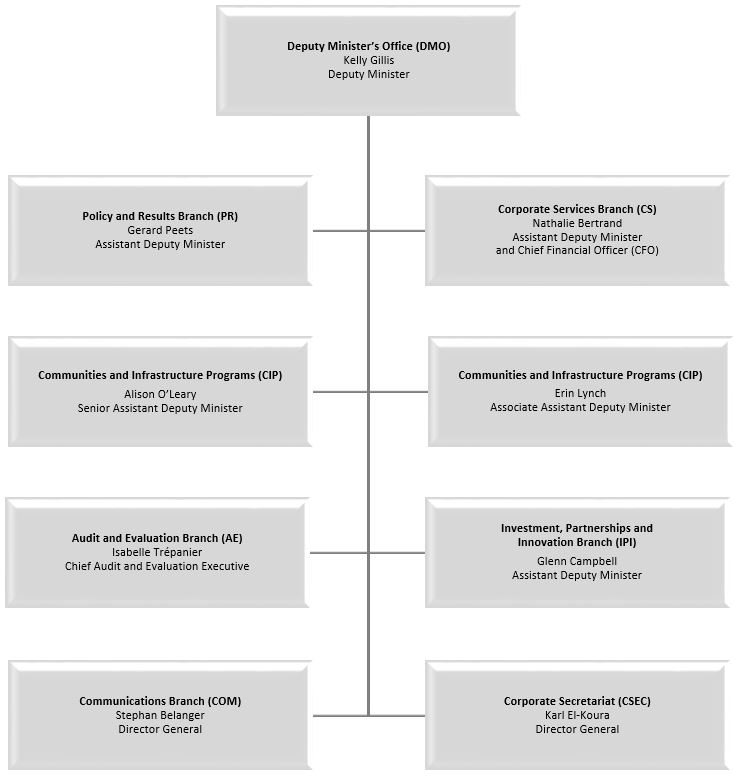Minister of Housing and Diversity and Inclusion Transition Book 2 (2021)
Department & Portfolio Overview
Minister of Housing and Diversity and Inclusion Transition Book 2 (2021)
Department and Portfolio Overview
- Mandate
- INFC Organizational Information
- Deputy Minister’s Office
- Policy and Results Branch
- Communities and Infrastructure Programs Branch
- Investment, Partnerships and Innovation Branch
- Corporate Services Branch
- Communications
- Audit and Evaluation
- Corporate Secretariat
- Constituting Legal Authorities and Agreements
Mandate
Public infrastructure projects help address a wide array of challenges for communities across the country—ranging from the rapid growth of our cities, to providing transit options to connect Canadians to employment, services, and recreational opportunities, to ensuring broadband access for rural and remote communities, to helping communities cope with climate change and environmental threats to our water and land. Infrastructure Canada (INFC) provides support to help ensure that Canadians across the country benefit from world-class, modern public infrastructure. To this end, the department makes investments, builds partnerships, develops policies, delivers programs and major projects while also considering alternative models to leverage private investment and participation in the planning and delivery of infrastructure in the public interest.
INFC is a key funding partner for provincial, territorial, municipal, and Indigenous partners. The department delivers and manages a broad spectrum of programming, including the Investing in Canada Infrastructure Program ($33.5 billion), Permanent Public Transit funding ($5.9 billion over 5 years, $3 billion annually thereafter), the Disaster Mitigation and Adaptation Fund ($3.4 billion), the Green and Inclusive Buildings Program ($1.5 billion), the Canada Community-Building Fund (formerly the Gas Tax Fund, $2.3 billion in 2020-21, indexed annually), and the Natural Infrastructure Fund ($200 million over 3 years) that are open to new project approvals, as well as delivering a dozen other fully allocated programs.
The INFC portfolio includes two of the largest bridge projects in North America; the Samuel De Champlain Bridge Project and the Gordie Howe International Bridge Project. While the Samuel De Champlain Bridge opened to vehicular traffic in early summer 2019, construction is continuing on implementation of the Réseau Express Montréal light rail and to complete work on the corridor. The Gordie Howe International Bridge is a new international crossing between Windsor, Ontario and Detroit, Michigan, scheduled to open in late 2024.
The department also houses a Rural and Programs Policy directorate under the Communities and Infrastructure Programs (CIP) Branch. This directorate supports the Minister for Rural Economic Development in implementing the Rural Economic Development Strategy. It also provides leadership for strong and resilient rural communities as an integral part of the Canadian economy, by working across departments and agencies (particularly with the Regional Development Agencies for rural community development, and collaborating with Innovation, Science and Economic Development Canada on rural broadband), with other orders of government, and a range of stakeholders. The Rural and Programs Policy directorate has developed a "rural lens” and provides advice for its use to provide a focus on rural needs in the design and delivery of federal programs and service, such as the Rural Transit Solutions Fund as a part of Permanent Public Transit funding.
The Infrastructure Canada portfolio includes responsibilities with respect to four organizations:
The Canada Infrastructure Bank (CIB) is an arm's length Crown corporation that leverages federal dollars to collaborate with public partners and private sector investors to deliver complex revenue-generating infrastructure projects in the public interest. The CIB is mandated to invest $35 billion in Canadian infrastructure projects over an 11-year period ending in 2027-28. The CIB is implementing a 3-year $10 billion Growth Plan launched in 2020 to invest in strategic initiatives such as zero-emission buses, energy efficiency building retrofits, agricultural irrigation, broadband, and clean energy transmission, renewables and storage. The CIB is focused on making investments, providing advisory expertise, and building knowledge as a centre of excellence about infrastructure investments. The CIB model is about thinking big and working with other levels of government over the short to long term to deliver more infrastructure for Canadians, and to reduce the burden on taxpayers.
The Windsor-Detroit Bridge Authority (WDBA) is responsible for the construction and operation of the Gordie Howe International Bridge between Windsor, Ontario, and Detroit, Michigan, which is being delivered through a public-private partnership. The project is also overseen by a binational governance entity known as the International Authority, which has equal representation from Canada and Michigan, and monitors compliance with the Canada-Michigan Crossing Agreement and the Project Agreement with the private partner
The Jacques Cartier and Champlain Bridges Incorporated (JCCBI) is responsible for managing, operating and maintaining the Jacques Cartier Bridge, the Champlain Bridge, the Bonaventure Expressway, the federal section of the Honoré Mercier Bridge, the Melocheville Tunnel, the deconstruction of the old Champlain Bridge and the Champlain Bridge Ice Control Structure.
Waterfront Toronto is a tri-governmental organization established under provincial legislation as a not-for-profit entity, responsible for leading and implementing the revitalization of over 800 hectares or nearly 2,000 acres of brownfield waterfront lands in Toronto. Its current major project is the Port Lands Flood Protection project. Through a joint tri-governmental funding commitment of $1.25 billion announced in 2017, this project will unlock 240 hectares of land for development in the underutilized Port Lands district through innovative flood protection engineering and renaturalization of the mouth of the Don River.
INFC Organizational Information
Unlike many federal departments, INFC has no enabling legislation. The work of the department is governed by a number of enabling acts and regulatory mechanisms. In 2020-21, INFC obtained stable and permanent funding to allow the department to strengthen the stewardship of Canadian infrastructure and meet evolving infrastructure needs in Canada.
Infrastructure Canada's budget in 2021-22 is $9.8 billion, and is comprised of four main elements; namely $128.3 million to support the department's operating functions and the salary of its 906 full-time equivalents (FTEs); $124.7 million allocated to Major Bridges, which is tied specifically to the Samuel De Champlain Bridge Corridor Project and the Gordie Howe International Bridge; $5.1 billion in Grants and Contributions funding, which is used to reimburse claims submitted by recipients; and $4.5 billion in statutory funding for the Canada Community-Building Fund, the Employee Benefit Plan, and Ministerial salary and car allowance.
The department principally operates from the National Capital Region, with the exception of the Samuel De Champlain Bridge Corridor Project team, which operates from Ottawa and Montréal.
Led by the Deputy Minister of Infrastructure and Communities, the department is served by four Assistant Deputy Ministers, one Associate Assistant Deputy Minister, two Director Generals, and one Chief Executive, working in seven functional areas, as outlined below:

Deputy Minister's Office
DEPUTY MINISTER
Kelly Gillis
Deputy Minister
The Deputy Minister's Office (DMO) serves as a single point of contact for Ministers and their offices to ensure horizontal linkages and integration of issues across the department. The Deputy Minister and her advisors provide Ministers and their staff with advice on all business lines of the department.
Kelly Gillis was appointed Deputy Minister of Infrastructure and Communities in September 2017. Infrastructure Canada is the Government of Canada department that provides long-term, predictable support to help Canadians benefit from world-class, modern public infrastructure; makes investments, builds partnerships, develops policies, delivers programs, and fosters knowledge about public infrastructure in Canada; and helps address complex challenges that Canadians face every day, ranging from the rapid growth of our cities, to climate change, and environmental threats to our water and land.
Prior to this appointment, Kelly served as Associate Deputy Minister of Innovation, Science and Economic Development Canada (ISED), and worked to develop Canada's Inclusive Innovation Agenda, to help develop an economy that promotes clean growth, high-quality jobs and increased prosperity.
Previous to this, Kelly held a number of positions within the federal government over the last 20 years, including, Senior Assistant Deputy Minister at Spectrum, Information Technologies and Telecommunications (SITT) Sector and Chief Financial Officer at Industry Canada.
Kelly holds a Bachelor of Commerce and Graduate Diploma in Public Accounting from McGill University and is also a qualified chartered accountant. Kelly is originally from Montréal. She and her husband have three children.
Deputy Minister's Office – Key Contacts
- Jennifer Eyre – Chief of Staff
- TBC – Infrastructure and Communities Departmental Liaison
- Line Geerts – Executive Assistant to the Deputy Minister
Policy and Results Branch
BRANCH HEAD
Gerard Peets
Assistant Deputy Minister
The Policy and Results Branch (PRB) identifies and assesses broad infrastructure issues, priorities, needs for potential federal action and also contributes to federal policy development. PRB reviews and assesses strategic infrastructure investments and provides advice on policy and cabinet issues. The Branch is responsible for reporting on results, focusing on data and research to strengthen evidence-based decision-making for all orders of government, and developing a place-based perspective to guide future investments in transit and other infrastructure. PRB is also responsible for delivering the National Infrastructure Assessment.
PRB – Directorates
- Tim Angus –Director General, Strategic and Sectoral Policy
- Sean Keenan – Director General, Economic Analysis and Results
- Julie Insley – Director General, Integrated Regional Planning
- Robert Judge – Director General, National Infrastructure Secretariat
Communities and Infrastructure Programs Branch
BRANCH HEAD
Alison O'Leary
Senior Assistant Deputy Minister
Erin Lynch
Associate Assistant Deputy Minister
The Communities and Infrastructure Programs (CIP) Branch manages the operations of all INFC programs, including implementing the Investing in Canada Infrastructure Program, the Disaster Mitigation and Adaptation Fund, the Green and Inclusive Community Buildings program, the Natural Infrastructure Fund, the new suite of transit programming, the Canada Community-Building Fund (formerly the Gas Tax Fund), as well as Legacy Programs. The branch supports infrastructure projects across the country in collaboration with provinces, territories, municipalities, Indigenous communities and other stakeholders, and provides program-related advice; risk management and analysis; environmental assessments; Indigenous consultation determinations; and program reporting.
The branch is also responsible for rural economic development, which works via a whole-of-government approach to coordinate research, analyze data, and provide advice regarding rural economic development issues. The branch advances strong and resilient rural communities as an integral part of the Canadian economy by working across departments and agencies, with other orders of government, and a range of stakeholders. The branch encourages a focus on rural needs in federal policies and programs.
CIP – Directorates
- Nathalie Lechasseur – Director General, Program Integration
- Pascal Girard – Director General, North / Atlantic / Ontario
- Michèle Ouellette – Director General, Québec / West
- Mark Matz – Director General, Transit
- Paul Loo – Director General, Resilient and Inclusive Communities
- Kirsten Mattison – Director General, Rural / Programs Policy, Planning and Reporting
Investment, Partnerships and Innovation Branch
BRANCH HEAD
Glenn Campbell
Assistant Deputy Minister
The Investment, Partnerships and Innovation (IPI) Branch is a centre of expertise that promotes the use of private capital to finance and implement alternative models of delivering infrastructure in the public interest.
IPI provides policy support for the research, advisory and investment activities of the Canada Infrastructure Bank, and the building and operation of nationally and internationally renowned major bridges.
IPI is responsible for program delivery through the P3 Canada Fund, intergovernmental partnerships through Waterfront Toronto, oversight and support for the Canada Infrastructure Bank, as well as the Gordie Howe International Bridge project in Windsor-Detroit and the Samuel de Champlain Bridge project in Montréal.
The Branch also supports horizontal policy development and monitors developments in the infrastructure finance sector, domestically and globally, in its mission to minimize the burden on Canadian taxpayers.
IPI – Directorates
- Mary McKay – Director General, Alternative Finance
- Patrick Kelly – Director General, Major Bridges and Projects
- Lisa Mitchell – Senior Director, Policy, Partnerships & Engagement
- Marie-Josée Lambert – Senior Director, Portfolio Management & Governance
- Shawn Hibbard – Acting Senior Director, Project Finance & Stakeholder Management
Corporate Services Branch
BRANCH HEAD
Nathalie Bertrand
Assistant Deputy Minister and Chief Financial Officer
The Corporate Services Branch (CSB) provides advice, support and services relating to INFC corporate functions, including procurement, human resources, finance, security, planning and administration, accommodations, information management, information technology, and anti-racism, equity and inclusion.
CSB – Directorates
- Michelle Baron – Director General, Finance and Administration
- Sylvain Campeau – Director General, Human Resources
- Joann Shields – Chief Information Officer and Director General, Information Management and Information Technology
- Michelle Seymour – Director Anti-Racism, Equity and Inclusion
Communications
BRANCH HEAD
Stephan Belanger
Director General
The Communications Branch provides advice, planning, and delivery of communications activities and products that support the department's mandate and that inform Canadians on progress and results of federal investments in infrastructure.
Audit and Evaluation
BRANCH HEAD
Isabelle Trépanier
Chief Executive Audit and Evaluation
The Audit and Evaluation Branch provides independent, evidence-based analysis and insight to senior management on departmental risks and operations to support the effective and efficient achievement of results for Canadians, fostering continuous improvement. The Branch is led by Isabelle Trépanier, Chief Audit and Evaluation Executive, who fulfills the dual role of Chief Audit Executive and Head of Evaluation for the department, and oversees the Internal Audit and Evaluation Directorates.
The Internal Audit Directorate helps INFC accomplish its objectives by bringing an independent, systematic, disciplined approach to evaluate and improve the effectiveness of risk management, internal control and governance processes. The Evaluation Directorate provides credible and neutral information on the ongoing relevance, impact and efficiency of the department's programs and initiatives to inform evidence-based decision making on policy, expenditure management and program improvements, thus supporting departmental accountability. The Branch is also the department's liaison with the Office of the Auditor General of Canada with respect to performance audits and environmental petitions.
Corporate Secretariat
BRANCH HEAD
Karl El-Koura
Director General, Corporate Secretariat
The Corporate Secretariat supports the department by providing advice and services in the areas of parliamentary affairs, access to information and privacy, Ministerial coordination and trips, executive correspondence, portfolio coordination, and internal governance.
The Corporate Secretariat manages the MINO Admin mailbox that can be used by Ministerial staff to submit questions related to human resources, IT and IM, accommodations, security, and other administrative matters.
Constituting Legal Authorities and agreements
Department name
- Office of Infrastructure of Canada, known as Infrastructure Canada, a division or branch of the federal public administration Schedule I.1 Financial Administration Act
Departmental legal authority
- There is no departmental statute/legislation
- Legal authority derives from an OiC P.C. 2004-0325 providing:
Her Excellency the Governor General in Council, on the recommendation of the Prime Minister, hereby authorizes the appropriate Minister, within the meaning of section 2 of the Financial Administration Act, for the Office of Infrastructure of Canada, a department set out in column I to Schedule I.1 of that Act, to enter into transfer payment agreements and contracts related to infrastructure initiatives in Canada.
Sur recommandation du premier ministre, Son Excellence la Gouverneure générale en conseil autorise le ministre compétent - au sens de l'article 2 de la Loi sur la gestion des finances publiques - du Bureau de l'infrastructure du Canada, ministère mentionné à la colonne I de l'annexe I.1 de cette loi, à conclure des accords de paiement de transfert et des contrats pour toute initiative en matière d'infrastructure au Canada.
Funding programs
- Canada Community-Building Fund – CCBF (formerly known as Gas Tax Fund – GTF)
- to provide monies to provinces, territories, municipalities, municipal associations, provincial, territorial and municipal entities & First Nations for the purpose of infrastructure
- Keeping Canada's Economy and Jobs Growing Act, S.C. 2011, c. 24, s. 161; replaced by:
- Economic Action Plan 2013 Act, No. 1, S.C. 2013, c. 33, section 233; amended by:
- Budget Implementation Act, 2019, No. 1, paragraph 375(1)(i)
- Budget Implementation Act, 2021, No.1, 2021, c. 23, Division 13, sections 198 & 199
- Canada Strategic Infrastructure Fund – CSIF (legacy fund)
- to provide for the payment of contributions for the carrying out of large-scale strategic infrastructure projects that contribute to economic growth or quality of life in Canada and that advance Canada's objectives with respect to infrastructure
- Designation of responsible Minister, OiC P.C. 2015-1235
- Canada Strategic Infrastructure Fund Act, 2002, c. 9, s. 47
Bridges
Transfers from the Department of Transport to the Office of Infrastructure of Canada the control and supervision of the bridges, OiC P.C. 2014-0144.
- New Bridge for the St. Lawrence Corridor Project (NBSL) – (Samuel de Champlain Bridge Corridor)
- Designation of the Minister for the purposes of the New Bridge for the St. Lawrence Act, OiC P.C. 2015-1242
- New Bridge for the St. Lawrence Act, S.C. 2014, c. 20, s. 375
- Gordie Howe International Bridge Project (GHIB)
- Crossing Agreement between Her Majesty the Queen in Right of Canada and the State of Michigan and the Crossing Authority, dated June 15, 2012
- Bridge to Strengthen Trade Act, S.C. 2012, c. 31, s. 179
- Transfers to the Minister of Infrastructure, the powers, duties and functions under the Bridge to Strengthen Trade Act, OiC P.C. 2015-1238
- International Bridges and Tunnels Act, S.C. 2007, c.1, section 29
Portfolio Organizations – Crown corporations / other entities:
Crown corporations:
- Windsor-Detroit Bridge Authority (WDBA)
- Designation of the Minister as the appropriate Minister for the WDBA, OiC P.C. 2015-1237
- Letters Patent of incorporation for the establishment of the WDBA:
- Letters Patent, dated October 9, 2012, OiC P.C. 2012-1350, Canada Gazette
- Supplementary Letters Patent, dated August 10, 2017, OiC P.C. 2017-1053
- Transfers to the Minister of Infrastructure the powers, duties and functions under the Letters Patent except any power, duty or function under s.9.1 of the Letters Patent, OiC P.C. 2015-1236
- Part X of the Financial Administration Act
- Canada Infrastructure Bank (CIB)
- Designation of the Minister for the purposes of the CIB Act, OiC P.C. 2017-1007
- Canada Infrastructure Bank Act, S.C. 2017, c. 20, s. 403;
- Part X of the Financial Administration Act
- Jacques-Cartier and Champlain Bridge Inc. (JCCBI)
- Designation of the Minister as the appropriate Minister for the JCCBI, OiC P.C. 2015-1241
- Canada Business Corporation Act, R.S.C., 1985, c. C-44
- Part X of the Financial Administration Act
- The Jacques-Cartier and Champlain Bridges Inc. Regulations (SOR 98-568), made pursuant to section 141 of the Canada Marine Act
Other shared governance entity:
- Toronto Waterfront Revitalization Corporation (TWR)
- Designation of the Minister to represent Her Majesty in right of Canada for the purposes of the Toronto Waterfront Revitalization Corporation Act, OiC P.C. 2015-1240
- Designation of the Minister for matters relating to the activities of the federal government with respect to Waterfront Toronto and includes the power to enter into transfer payment agreements and contracts for the acquisition of services, OiC P.C. 2015-1239
- Toronto Waterfront Revitalization Corporation Act, S.O. 2002, c.28
Report a problem on this page
- Date modified:








